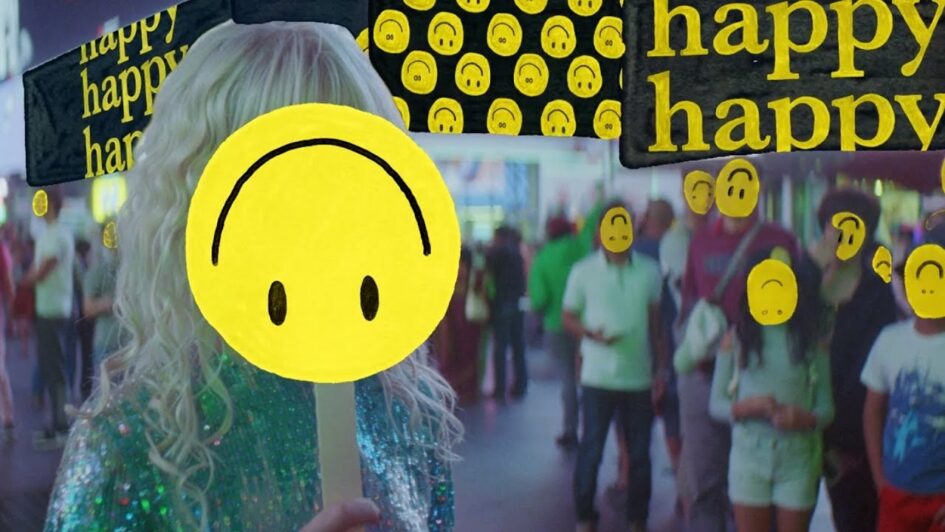“Fake Happy” by Paramore is a song that highlights an individual, yet collective, experience of battling mental health issues while being forced to put on a “happy face” for the outside world. “Fake Happy” was released in 2017, which was an extremely difficult time for Paramore’s lead singer and songwriter, Haley Williams. According to an interview with Paper Magazine, the album that features “Fake Happy”, After Laughter, was released a month before Williams separated from her husband. This was also around the time that Paramore was involved in a lawsuit with the band’s former bassist. While writing After Laughter, Williams had a lot of things to be angry about, which were presenting themselves in the form of depression. When interviewed, she said that “all the things [she] tried to let go of, when [they] went on tour, just came crashing back down on [her]”, resulting in the choice to go to intensive therapy (https://www.papermag.com/hayley-williams-zane-lowe-depression-2645018230.html?rebelltitem=4#rebelltitem4 ). This is important in creating context for the way the song is interpreted and how the artist delivers emotion in performance and delivery.
Rosenthal and Flacks explain that “genres and other musical codes and conventions provide frameworks that guide our interpretations of what we are hearing” (52). Paramore’s music style falls into the categories of pop punk, pop rock, alternative rock, emo, and new wave. Because these genres are known for producing music that is conventionally richer in meaning, there exists the assumption that these songs will be filled with emotion.
In the case of “Fake Happy”, Williams combines this assumption of emotion with overt lyrics to communicate her message to the audience. For example, she comes out and directly says “But I’m so fake happy” and “I feel so fake happy”, which tells listeners exactly how she is feeling. Later in the song, after creating sentiments of emotional turmoil, Williams says, “You see it’s easy when I’m stomping on a beat, but no one sees me when I crawl back underneath”. These lines serve as a direct critique of our society’s disregard for self care. This is especially true for artists who are forced to perform both in their craft, but also with regards to the image that they project to the world. In “Fake Happy”, Williams also says “If I smile with my teeth, bet you believe me, If I smile with my teeth, I think I believe me” which also brings up the point of tricking not only everyone around you into thinking that you are okay, but also yourself.
In 2016, an organization called Help Musicians conducted the largest known study, at the time, to investigate the relationship between mental health and the music industry. They found that 68.5% of 2,211 musicians surveyed had reported experiences of depression. They also discovered that 71.1% of respondents reported high levels of anxiety and panic attacks (https://www.musicmindsmatter.org.uk/the-study/ ). These statistics further prove how Haley Williams is not alone in her struggles with mental health and demonstrate how individual experiences often turn into a collective understanding.
Megan Gullotta

October 2, 2022 at 1:16 pm
Megan,
This is an interesting discussion of “Fake Happy,” and I’m pleased you were able to locate and share information on the background of the song as it related to Haley Williams.
That’s important information, but more important is how the song was able to connect to listers at a time when many people could be said to be putting on a happy face. It’s vital not to merely associate the protagonist in the song with Haley Williams (just like we don’t assume the protagonist in “Born in the USA” is Springsteen), as when a song enters the public sphere it takes on a meaning of its own. The song speaks to people in large part because they can identify with the protagonist, because of the situation they find themselves in. Think about 2017: Trump entered office, the #metoo movement was in full swing, Black Lives Matter was all over the news, the first studies showing how social media contributes negatively to mental health were coming out, and so on. It was a pretty terrible time for many — an only got worse with COVID, giving the song even more longevity.
When adding links, please link meaningful phrases in the sentence rather than merely pasting the URL in parenthesis. And be sure to add other features that are important to blogs and blog readers: links whenever having one would make a meaningful connection, images, embedded video and/or audio, and so on.”
Bill